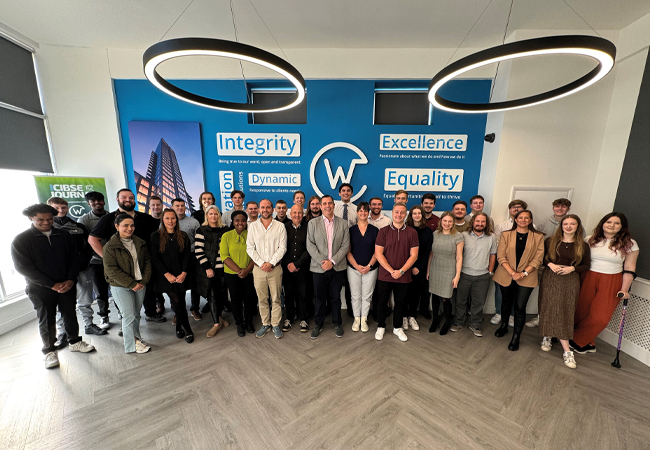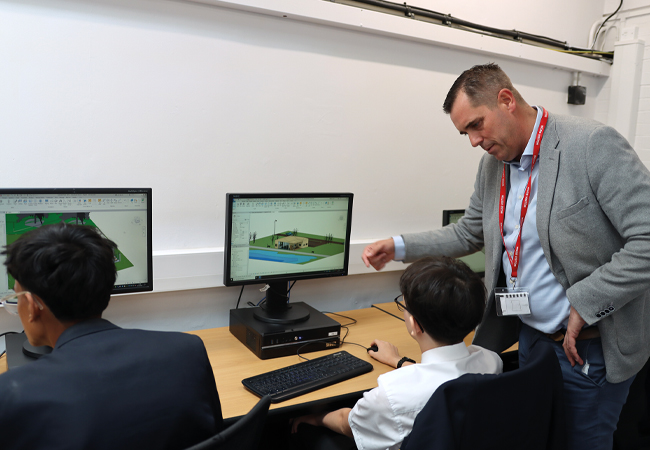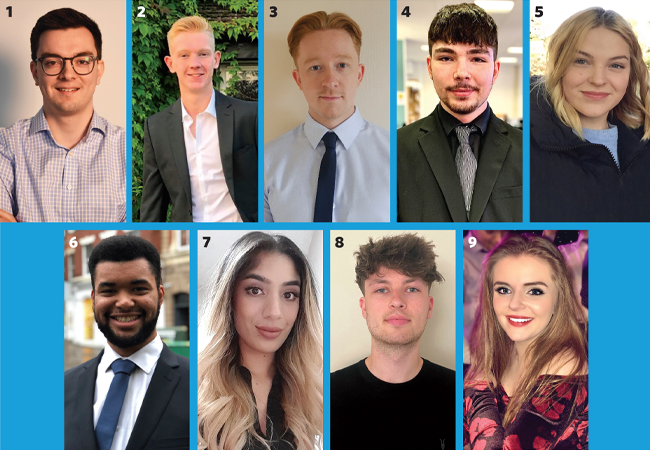
Whitecode Consulting has sponsored many engineers through a degree apprenticeship
Alex Hill is passionate about promoting building services engineering as a career. For more than 30 years, the managing director of Whitecode Consulting, a building services company, has been visiting schools, extolling the virtues of the industry that ‘will get us to net zero’.
He is most enthusiastic about degree apprenticeships where students sponsored by design engineers apply their university learning to real-world projects while receiving a salary.
Degree apprenticeships are the bedrock of Whitecode’s recruitment strategy. An astonishing 60-65 employees have been sponsored by the firm through a degree apprenticeship, a feat that was recognised by judges at the 2023 Young Engineer Awards when Whitecode won the Employee of the Year award in the small company category.
Hill has a longstanding relationship with his old school – Wilmington Grammar School, Dartford – where he kept in touch with his engineering teacher Mr Booker (now retired) and went back to promote building services to students. He continues to visit, working with current engineering teacher Sarah Cross.
As a result of Hill’s talks, many pupils have been inspired to join Whitecode on a building services apprentice degree scheme with London South Bank University (LSBU).
If we can’t find engineers, we need to make engineers
‘If we can’t find engineers, we need to make engineers,’ says Hill. ‘With a skills shortage in the sector, we need people from our industry to go into schools and say: “Hi, there’s something other than manufacturing that we do in engineering. Give us a chance.”’
Hill is frustrated with how much attention is paid to manufacturing in schools, when the UK no longer does a lot of making. ‘Schools, in my opinion, don’t really cater for engineering disciplines that don’t make things,’ he says. ‘In building services, we design a lot of things, but the components aren’t made in the UK.
‘I would love to say to the Education Secretary: “Take all the lathes out of your schools and instead put in a computer suite full of computers with AutoCAD and Revit installed.”’
Hill says degree apprenticeships have benefits for both students and sponsoring firms. They allow Whitecode to nurture staff through their training, and the university has an active interest in how their students are progressing at work, says Hill.
‘LSBU wants to make sure the students learn something here as well as at university. I think this is really key and it’s not something students would get on a degree alone,’ says Hill.
‘The route also gives engineers a specific degree in an industry that you know you want to work in,’ says Hill. ‘People often say that only 15% of a degree is used in actual daily life, but I would flip that around for the building services degree course at LSBU.’
The career route is financially beneficial for all parties, says Hill. ‘Students may start working young, but they save money because they’re living at home, which means they can save up enough money to move house.’
Once they finish their degree, Hill says his company is then prepared to pay them well because ‘they’re really worth it because they’ve got four years of experience’.
In presentations to pupils’ parents, Hill says he shows the salary survey in the CIBSE Journal to illustrate his point. ‘My pitch is simple: “We’ll offer your child a free degree and a job for life.”’
Amy Webb

Intermediate sustainability engineer
Having been inspired to start an engineering career by my grandfather, I joined six years ago as part of Whitecode’s apprenticeship programme. I like to problem solve and engineering allows me to combine analytical skills with creativity to find solutions.
I went to university part-time to gain a building services degree and worked at Whitecode to develop real-life working skills. Full-time university life wasn’t a match for what I wanted, which was to pursue a career as early as I could.
The company has been amazing in supporting me, and developing essential skills. Mentorship, performance reviews, and networking have helped me progress.
The exposure to real projects has allowed me to solidify my understanding at university and grow in my role as an engineer.
The government apprenticeship scheme only costs Whitecode £218 a year per student. ‘This means we can take on as many apprentices as we want,’ says Hill. ‘The only limiting factor is having enough mentors in the company.’
Whitecode is keen for its students to get as much hands-on experience as possible. ‘There’s nothing better than going on site and seeing the consequences of your design,’ says Hill. ‘Having that level of input from experienced people helps engineers and BIM technicians deliver robust designs.’ In the UK, Hill believes there is too much emphasis on non-vocational degrees. He says ‘it drives him mad’ that people do degrees in subjects they won’t be using in their careers, especially given the amount of debt that builds over the length of the course.
‘My father-in-law’s got a degree in ancient history and he’s a VAT adviser. Surely accountancy would’ve been a better degree?’
Hill says Whitecode will consider graduates if they have the relevant skills and demonstrate a passion for engineering in their interview but he says there are downsides.
‘Graduates are older, and are going to quickly get lots of responsibilities, which means they are going to probably move around the industry, looking for that next salary increase,’ says Hill.

Alex Hill discusses a student’s Revit model at Wilmington Grammar School
Whitecode offers work experience to 16-year-olds after their GCSEs and seeing their ability at that age convinces Hill they can be developed into engineers at a very young age.
‘That young mind is so easy and quick to train. They’re like sponges,’ he says, giving an example of a boy on work experience who has built a real-life IES model in less than a week.
While interest from female engineers is still quite low, Hill says there are now more women in every job position in building services. ‘The industry is a great opportunity for girls,’ says Hill. ‘We see a really different perspective from female engineers. Men can have quite a rigid approach and sometimes that thinking out of the box comes from female colleagues.
Mikolaj Ogorek

Providing training and ongoing support to students at Wilmington Grammar School has enabled the MEP consultants to invest in the potential of young engineers, including Junior Building Services Engineer Mikolaj Ogorek.
Having been introduced to Whitecode Consulting by his engineering teacher, Mr Brooker, Mikolaj was inspired to begin a career in building services engineering. He explains: ‘Initially, I wanted to pursue architecture at university, but thanks to Whitecode Consulting’s Managing Director Alex Hill and Mr Brooker, my eyes were opened to a new world of possibilities.
‘When Alex came to speak to my sixth form and told us about Building Services Engineering, Whitecode Consulting’s innovative focus on building services solutions inspired me and I thought that this was something I would add value to. To my excitement, I was
accepted onto the Apprenticeship Scheme in 2021.
‘Whitecode’s commitment to nurturing the professional growth of its young engineers is evident from the moment you join the company. From the outset, I was provided with opportunities to enhance my skills and knowledge. I was given a lot of responsibility straight away, unlike other companies where trainees typically work on basic schematics and drawings.
‘The work culture at Whitecode Consulting has been instrumental in shaping my personal and professional growth.’
‘It’s important to get our female engineers back to our schools, championing building services and saying: “I’ve done this. I was you then. You could be me,”’ he says.
Whitecode has ambitious plans to open more offices around the UK using the same recruitment model.
‘We’ve just opened an office in Birmingham and I’m trying to identify A, the university course and B, the local grammar school that has an engineering teacher who might be interested in the support we can provide,’ says Hill.
The next target is Manchester or Leeds and then Hill wants to see a national rollout of this strategy – but, he says, the model will need local champions for building services. Whitecode Consulting – Building Services Consultants
See here for the Employer of the Year 2024 shortlist

